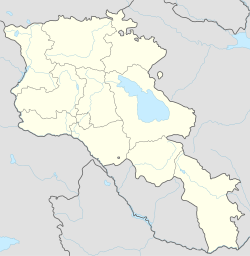Jermuk
| Jermuk Ջերմուկ |
||
|---|---|---|

From top left:
Jermuk skyline • Arpa River Spa resorts • Jermuk Forest Sanctuary Jermuk ropeway • Jermuk Waterfall Panoramic view of Jermuk |
||
|
||
| Coordinates: 39°50′30″N 45°40′20″E / 39.84167°N 45.67222°ECoordinates: 39°50′30″N 45°40′20″E / 39.84167°N 45.67222°E | ||
| Country |
|
|
| Marz | Vayots Dzor | |
| First mentioned | 13th century | |
| Government | ||
| • Mayor | Vartan Hovhannisyan | |
| Area | ||
| • Total | 5 km2 (2 sq mi) | |
| Elevation | 2,080 m (6,820 ft) | |
| Population (2011 census) | ||
| • Total | 4,628 | |
| • Density | 930/km2 (2,400/sq mi) | |
| Time zone | GMT +4 (UTC+4) | |
| Website | Official web | |
| Population: | ||
Jermuk (Armenian: Ջերմուկ) is a mountain spa town in the southern Armenian province of Vayots Dzor Province, 53 km east of the provincial capital Yeghegnadzor. It was a popular destination during the Soviet era and nowadays is still famous for its hot springs and mineral water brands bottled in the town. It is attractive for its fresh air, waterfalls, artificial lakes, walking trails, the surrounding forests and mineral water pools. The town is being redeveloped to become a modern centre of tourism and health services. Jermuk is also being set up to become a major Chess centre, with numerous chess international tournaments scheduled in the town.
As of the 2011 census, the population of the town is 4,628. The nearby village of Kechut (pop. 1,083) is also part of the municipality (community) of Jermuk.
The name of the town is derived from the Armenian word of "jermuk" () or "jermook", in Western Armenian "chermoug" meaning "warm mineral spring", first mentioned during the 13th century by historian Stepanos Orbelian in his work "History of the Province of Sisakan".
Jermuk occupies an area which is historically considered as part of the Vayots Dzor canton of the Syunik province of Ancient Armenia. It was first mentioned during the 13th century by historian Stepanos Orbelian in his work "History of the Province of Sisakan". The remains of an ancient cyclopean fortress and the ruins of an 8th-century basilica testify that the region around the fountains of Jermuk has been settled long before the 13th century. The area of Jermuk has been ruled by the Siunia dynasty between the 10th and 13th centuries, when Vayots Dzor was part of the Kingdom of Syunik. The princes of Syunik regarded the mineral springs of Jermuk as healing and built several pools filled with it, thereby making the little town their holiday destination. During the Middle Ages, the Silk Road passed through the area of Vayots Dzor, particularly the road that currently links the town of Martuni with Yeghegnadzor to the northwest of Jermuk.
...
Wikipedia


